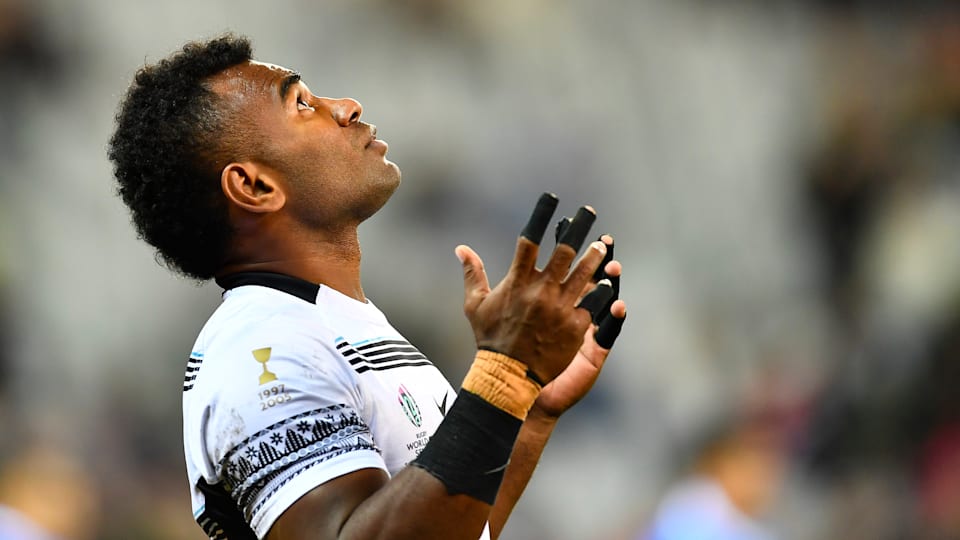Fijian rugby sevens star Jerry Tuwai: "I can carry on playing because of the togetherness that I feel for my boys"

At 35 years old, rugby sevens legend Jerry Tuwai is playing with a new lease of life.
Just four months ago, Fijian rugby’s only two-time Olympic gold medallist was left out of the team by coach Ben Gollings, who cited concerns over his fitness levels.
Tuwai, who had also been helping out by coaching the Fijiana women’s 7s team, responded by blasting the Englishman on social media, questioning his ability to ‘handle’ coaching the Fijian team. It seemed like the veteran playmaker’s time in the famous white shirt was over.
But in March 2024, Tuwai was handed a lifeline when Gollings was replaced as the Fiji men’s sevens coach by Tuwai’s former teammate, and Rio 2016 skipper, Osea Kolinisau.
After getting himself back in shape, Tuwai was selected for the World Rugby Sevens Grand Final in Madrid, where an improved performance saw the team land third place. To cap off a memorable three days, Tuwai was named in the tournament’s Dream Team.
“I've been playing sevens for the Fijian team for 10 years, and to be left out for a few months, if I’m honest, it really hurt me,” Tuwai told Olympics.com at the SVNS Grand Final in Madrid.
“But to come back to the team with the support that I have around me, my family, my coaches and of course my boys, and the belief that they have for me, it gave me the strength and belief to keep on going.”
How rugby changed Jerry Tuwai's life
The story of Tuwai’s difficult childhood, where he could barely afford rugby boots, is well documented.
Rugby changed his life, and means far more to him than being simply a job.
To have that briefly taken away, meant that his Madrid homecoming tasted all the sweeter.
“I love it. I love being with the boys and being in the team,” he continued.
“From my upbringing, from where I came from, this sport has been God's blessing for me.
“Its values changed me as a person. It humbles me. It gives me a sense of connection and love and care for my brothers and for the people around me. It means everything to me.”
In Tuwai’s younger years, he was famous for footwork and breathtaking speed that made a mockery of defensive lines around the world.
While many of the Pacific island nation’s sevens players opted for lucrative contracts in the 15-a-side game in France, England, and Japan, Tuwai chose to stay with the sevens team.
After becoming one of the most experienced players in the team, he was chosen to captain the side that would go on to defend their Olympic title at Tokyo 2020, in 2021.
While his speed is certainly not what it once was, he brought obvious leadership skills and a calming presence to the team that pay dividends on the sport’s biggest stages.
*“*I think that I bring a lot of experience to the team thanks to being in the sport for 10 years,” he said.
“You cannot train that experience as it requires years to build. I am not the fittest in the team now but I contribute leadership because I led the team before and they have respect for me. I also have respect for them and I think that is what got us through.
“Yes, it's different now. I have to work harder and stretch a lot because I’m more tight! But my value to the team is more on the mental side of the sport.”
Hoping for a golden hat-trick at Paris 2024
Rugby sevens made its Olympic debut at Rio 2016 and, if selected for Paris 2024, Tuwai will be the only Fijian player to appear at every edition.
Having already created history as a double Olympic gold medallist in the sport, he has eyes for a hat-trick.
“I want a third. I thought I’d lost the opportunity a few months ago, but, yes, I'm here now and I'm thinking about it a lot,” he said.
“Hopefully I can prove that I can carry on for a few months. I feel like I can carry on because of the togetherness that I feel for my boys. It’s the same feeling that has carried our team throughout the years and has got us to this place."
Nothing encapsulates Tuwai’s reasoning for wanting to represent Fiji at another Olympic Games better than the song the team sings before every training session and every match. It reminds the team of what they are playing for and creates a bond between the players before they go into battle.
“It means, "Our beloved country,” and we will die for it every moment in that game.”